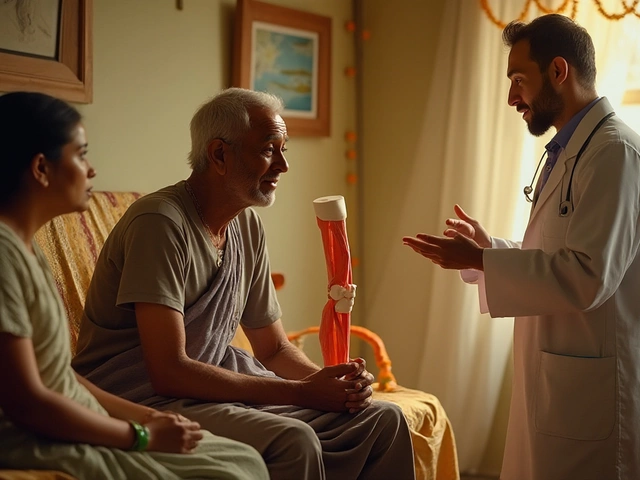
Want to drop those extra pounds fast? First things first—portion control can make a world of difference. Most of us tend to underestimate how much we eat. Simply serving smaller portions can be a significant change that yields results.
Then there's protein. Who knew it could be your best buddy in weight loss? Protein helps you feel full longer, reducing those mid-day or late-night snack cravings. Think lean meats, beans, or even a protein shake.
But wait, don't forget to keep yourself hydrated! Sometimes we mistake thirst for hunger. And let's talk about sleep—getting enough shut-eye can make or break your weight loss journey. Lack of sleep stresses your body and can lead to weight gain.
- Portion Control: A Game Changer
- The Power of Protein
- Keep Hydration and Sleep in Mind
- Exercise Smart, Not Hard
- Managing Stress
- The Impact of Weight Loss Clinics
Portion Control: A Game Changer
Ever left a restaurant regretting how much you ate? You're not alone. The truth is, oversized portions are sneaky culprits behind that stubborn weight. Embracing portion control can help you manage what you eat without drastically changing your diet.
Why Size Matters
Understanding your portions is crucial. A typical restaurant meal is almost double the amount you need, and that can add up fast. Did you know the average plate size in America over the years has increased by nearly 30%? It's no wonder we're consuming more.
Simple Hacks to Control Your Portions
Start by using smaller plates. It's a trick that makes a big difference, visually tricking your brain into thinking you're eating more than you are. Another tip? Watch your serving sizes when it comes to calorie-dense foods. Think nuts, cheeses, or oils. A little bit can go a long way.
- Measure your snacks—rather than diving into a bag of chips, portion them out first.
- When dining out, box half your meal to save for later.
- Eat slowly to give your body time to recognize fullness.
When Less Becomes More
The goal isn't to deprive yourself but to eat smarter. By reducing portions, many find themselves more energized and comfortable throughout the day. It’s about finding balance, not starvation.
| Food Item | Typical Serving Size | Portion-Controlled Size |
|---|---|---|
| Pasta | 2 cups | 1 cup |
| Chicken Breast | 1 whole breast | 1/2 breast |
| Cheese | 2 slices | 1 slice |
So next time you face a huge meal, remember that little changes in portion size can be game changers in your quick weight loss journey.
The Power of Protein
So, why is protein such a big deal when you're trying to lose weight? It's all about feeling full. Protein is super effective at curbing hunger because it takes longer for your body to break it down compared to carbs or fats. This means you won't be reaching for snacks as often, which helps you stick to your weight loss goals.
Ever heard of the thermic effect of food (TEF)? It’s a fancy term for the energy your body uses to digest, absorb, and process nutrients. Protein has the highest TEF, burning more calories just from being digested. Basically, eating protein can increase your metabolism for a short period after meals. Cool, right?
Choosing the Right Protein
You might wonder, which proteins should you be eating? Lean meats like chicken or turkey are great, but don't forget plant-based options like quinoa, beans, and lentils. They're not only packed with protein but are also rich in fiber, another weight-loss friendly nutrient.
For those of you who hit the gym, a protein shake post-workout can help with muscle recovery. Remember, building muscle actually aids in burning calories even when you're not working out.
How Much is Enough?
Getting the right amount of protein is key. Most folks need about 0.8 grams of protein per kilogram of body weight. But if you're seriously pushing yourself with intense workouts, you might bump that up to 1.2 to 2.0 grams per kilogram.
| Source | Protein per 100g |
|---|---|
| Chicken Breast | 31g |
| Lentils | 9g |
| Greek Yogurt | 10g |
Whether you're aiming for a high-protein breakfast or a post-dinner snack, there's a ton of options out there. Bottom line, incorporating more protein into your diet is a solid strategy for effective and quick weight loss.
Keep Hydration and Sleep in Mind
Hydration and sleep might not be the first things you think of when you're figuring out how to drop those pounds, but they're crucial players. Drinking enough water can actually boost your metabolism by about 30% over one to one and a half hours! So if you're eyeing weight loss, grab that water bottle.
Here's another tip: drink a glass of water before meals. It can help you feel fuller and drop your weight more effectively over time. Aim for about half a gallon a day, but let's be real—listening to your thirst is key.
Importance of Sleep
Now, about sleep—don't underestimate its power. Studies have shown that people who sleep less than seven hours a night are heavier and have more issues shedding a quick weight. Lack of sleep messes with hormones that control hunger, making you eat more.
Ever heard of ghrelin and leptin? These are the hormones we're talking about. Ghrelin, which makes you hungry, shoots up when you don't sleep well. Leptin, which tells you you're full, drops like a rock. Not a good combo if you're trying to manage weight.
Consistently getting seven to nine hours of quality sleep can help keep these hormone levels in check, making it easier to say no to those late-night snacks.
Balancing Both
Aiming for a good balance of hydration and sleep can make all the difference. Create a bedtime routine, limit caffeine past noon, and stick to a regular sleep schedule. And of course, carry a water bottle as your daily companion.
Stay hydrated, rest well, and you'll notice your body thanking you as you make strides towards your weight loss goals.

Exercise Smart, Not Hard
We live in a world where more is often seen as better. But when it comes to exercise for weight loss, smarter beats harder every time. You don’t need to spend hours at the gym; instead, focus on maximizing your efficiency.
Hit the Highs with HIIT
Heard of High-Intensity Interval Training (HIIT)? It's one heck of a method to burn fat and increase metabolism in less time. Studies show just 15 minutes of HIIT can have the same benefits as an hour of jogging. Talk about saving time!
Strength Over Sweat
Don't just get your cardio fix—include strength training too. Building muscle helps torch calories more effectively, even after you’ve left the gym. Just a couple of days a week of strength training can do wonders.
Staying Active Adds Up
Daily activity counts more than you think. Little things like taking the stairs, walking to the store, or even stretching while watching TV can add up to big calorie burns.
- Walk or bike instead of driving short distances.
- Use a standing desk at work.
- Take regular mini-breaks to move around.
Remember, it’s about consistency. Make it enjoyable; you're more likely to stick with it. Maybe that means dancing around your living room or a quick game of basketball with friends, whatever keeps you moving while having fun.
Managing Stress
Stress and weight loss have a complicated relationship. When you're stressed, your body releases cortisol, which is great if you're facing a real danger because it boosts energy. But in everyday life, too much cortisol can increase cravings for unhealthy foods, leading to weight gain.
Identifying Stress Triggers
Understanding what stresses you out is the first step. Is it work? Family issues? Once you pinpoint the triggers, you can start figuring out how to handle them better.
Effective Stress Management Techniques
- Exercise: Regular physical activity can be a great stress reliever. Even a short walk can do wonders for your mental state.
- Meditation and Deep Breathing: These can lower cortisol levels. Spend just five minutes focusing on your breath, and you might notice a difference.
- Sleep: Make sure you're getting enough shut-eye because being tired can make stress feel worse.
- Talk it Out: Whether it's with a friend or a professional, sometimes just talking about what's bothering you can help lighten the load.
Data Insights
Research has shown that people who implement stress management techniques can lose up to 11 more pounds compared to those who don't have a stress management plan.
By keeping stress in check, you'll find that your journey to quick weight loss becomes a lot smoother. Remember, when your body feels less stressed, it won't hold onto excess weight as a defense mechanism.
The Impact of Weight Loss Clinics
Ever wondered how weight loss clinics can really make a difference in your journey to shed pounds? These clinics have gained popularity because they offer more than just diet plans. They provide a comprehensive approach that combines medical expertise, personalized plans, and sometimes even psychological support.
To start, they usually have a team of professionals, including dietitians and sometimes doctors, who can tailor a plan that's right for you. This means they look at your whole health profile—not just your weight. This personalized touch is often what's missing when we try to handle weight loss on our own.
Medical Support and Monitoring
A big game-changer is the medical support you receive. Clinics can offer medical treatments and monitor your progress regularly to ensure you're losing weight safely. They can keep tabs on things like blood pressure and cholesterol, which is a bonus for overall health.
Structured Environment
These clinics provide a structured environment with set goals and milestones. This kind of structure can be motivating because you're not just winging it. You have a roadmap and checkpoints to keep you on track.
Behavioral Counseling
Many clinics also offer behavioral counseling to help you understand the 'why' behind your eating habits. This can be crucial for long-term success. Knowing the psychological part of weight gain or loss gives you the power to make lasting changes.
But hey, it's not just about services; it's about results. On average, people working with weight loss clinics can lose 3-5% more of their initial body weight compared to those who go it alone. This small difference can be huge in terms of health benefits.
So if you're serious about dropping weight fast and keeping it off, exploring what a weight loss clinic offers might just be worth your while.





Rohan Talvani
I am a manufacturing expert with over 15 years of experience in streamlining production processes and enhancing operational efficiency. My work often takes me into the technical nitty-gritty of production, but I have a keen interest in writing about medicine in India—an intersection of tradition and modern practices that captivates me. I strive to incorporate innovative approaches in everything I do, whether in my professional role or as an author. My passion for writing about health topics stems from a strong belief in knowledge sharing and its potential to bring about positive changes.
view all postsWrite a comment